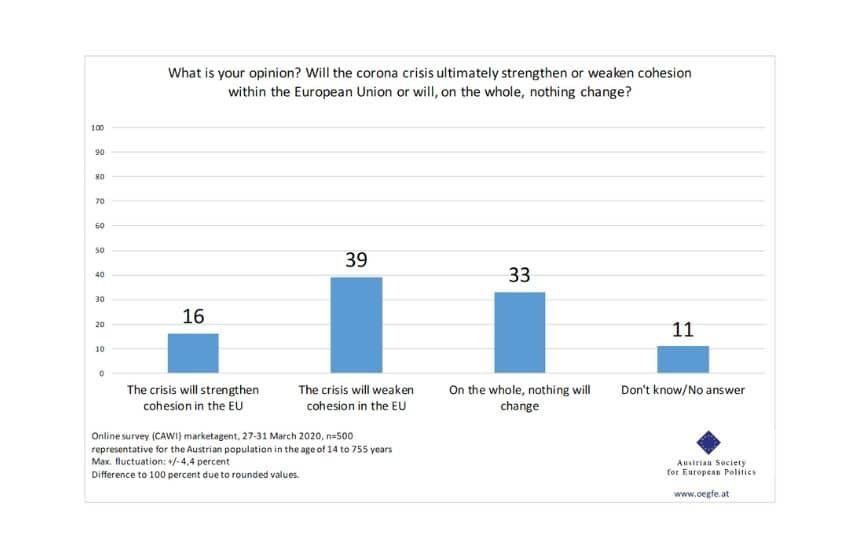In the new ÖGfE online survey conducted from March 27 to 31 (marketagent.com), 39 percent of respondents assume that the current crisis will “rather weaken” cohesion within the EU, while 16 percent assume that it will be strengthened. A third of the respondents think that “on the whole nothing will change”, 11 percent do not comment on this question. Men are more skeptical on this point than women with 45 percent predicting a weakening of EU cohesion. Female respondents only agree to 34 percent.
41 percent of those questioned say that it would make sense to give the EU additional competencies in the field of health policy “in order to be able to take cross-border measures to better counter health risks and dangers”. 42 percent, on the other hand, consider this “not useful”. Almost a fifth (17 percent) cannot judge this question. This question also shows differences in the opinions of women and men: While 47 percent of men do not consider such a shift in competence to be sensible, the number of skeptics is 37 percent.
Three out of four respondents (75 percent) say it makes sense that the European Union has suspended the budget and deficit rules for the member states during the Corona crisis in order to support their economy. A little more than a tenth (12 percent), on the other hand, do not agree, 14 percent answer “don’t know” or make no statement. Approval for this step rises continuously with increasing age: from 71 percent among 14 to 29 year olds to 80 percent among 60 to 75 year olds.
In view of the Corona crisis, 30 percent of Austrians say that it is more of an “advantage” that our country is a member of the European Union. 17 percent see it as a “disadvantage”. For 43 percent, „it makes no difference“ (11 percent „don’t know / no answer”). Again, men are more skeptical in this regard than women(„EU membership is a disadvantage: 22 percent vs. 12 percent).
The current survey was conducted from 27 to 31 March 2020 by marketagent on behalf of ÖGfE. 500 persons were questioned online (CAWI / representative for the Austrian population between 14 and 75 years). Maximum margin of fluctuation approx. +/- 4,4 percent. Difference to 100 percent due to rounded values.






